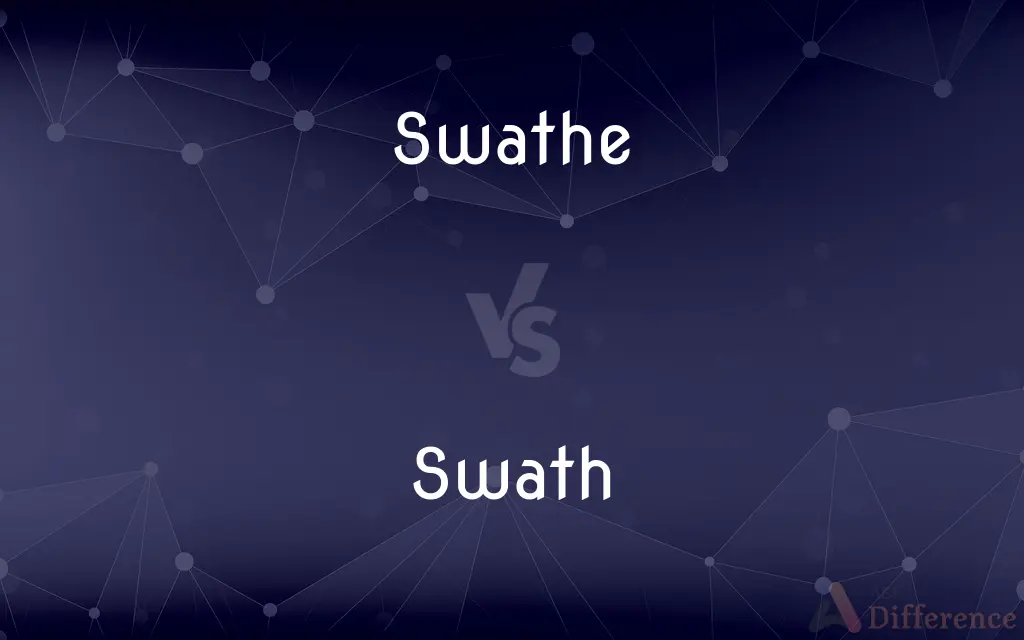Swathe vs. Swath — What's the Difference?
Edited by Tayyaba Rehman — By Fiza Rafique — Updated on March 19, 2024
Swathe refers to wrapping or binding with layers, often used metaphorically or physically. Swath, however, commonly denotes a broad strip or area of something, especially land or grass cut or cleared.

Difference Between Swathe and Swath
Table of Contents
ADVERTISEMENT
Key Differences
Swathe typically conveys the act of wrapping or enveloping in layers, suggesting protection or concealment, often used in contexts ranging from medical bandaging to metaphorical expressions of care. On the other hand, swath is most commonly associated with agriculture, describing a path or strip of grass, grain, or other crop that has been cut or cleared by a scythe, mower, or another tool. This term also metaphorically extends to any broad strip or area of a particular type.
While swathe implies an action or process, focusing on the method and intention behind covering or wrapping, swath describes a result or outcome, specifically the visible effect on a landscape or field. Swathe emphasizes the interaction between the entity doing the wrapping and the object being wrapped, whereas swath highlights the physical change in the landscape.
Swathe can also denote a general sense of envelopment that goes beyond physical wrapping, suggesting immersion or surrounding in non-tangible qualities like sound or emotion. In contrast, swath, beyond its agricultural origins, is used to delineate spatial extents within various contexts, underscoring its versatility in describing physical spaces rather than actions or processes.
Swathe, in its verb form ('to swathe'), explicitly requires an object to act upon, underlining its utility in contexts that involve care, protection, or preparation. Meanwhile, swath, primarily a noun, serves to quantify or describe areas affected by an action, making it indispensable in discussions of scope, size, and impact.
While swathe and swath may share superficial phonetic similarities, their applications diverge significantly, reflecting their distinct roles in language as a verb emphasizing protective action and a noun detailing the breadth of impact, respectively.
ADVERTISEMENT
Comparison Chart
Part of Speech
Verb (also used as a noun)
Noun
Primary Meaning
To wrap, bind, or envelop closely with something
A broad strip or area of something, especially land
Contexts
Medical, care, protection, metaphorical
Agriculture, landscaping, metaphorical for space or extent
Example Usage
Swathe a baby in blankets
Mow a swath through the lawn
Associated Actions
Wrapping, enveloping, covering
Cutting, clearing, defining an area
Compare with Definitions
Swathe
To cover or envelop something completely.
The artist's latest work is swathed in mystery.
Swath
A row or line of grass, grain, or other crop as it lies when mown or reaped.
Walking through the swath in the field felt surreal.
Swathe
Used as a noun, a wrapping or bandage.
She adjusted the swathe around her injured arm.
Swath
A path made by the sweep of a scythe or the blade of a mower.
He made a neat swath through the tall grass.
Swathe
To wrap in several layers of fabric.
The nurse swathed the wound with bandages.
Swath
A strip, belt, or long and relatively narrow extent of anything.
The tornado cut a swath of destruction through the town.
Swathe
To envelop or surround in a protective or comforting manner.
The fog swathed the town in a ghostly embrace.
Swath
Used metaphorically to indicate a broad range or variety.
The documentary covers a wide swath of history.
Swathe
To bind tightly with clothes or bandages.
They swathed the newborn in a soft blanket.
Swath
An area affected or encompassed by a particular condition.
The new policy affected a broad swath of the population.
Swathe
A swathe (: rhymes with "bathe") or swath (: rhymes with "cloth") is the width of a scythe stroke or a mowing-machine blade, the path of this width made in mowing or the mown grass or grain lying on such a path. The mower with a scythe moves along the mowing-edge with the uncut grass to the right and the cut grass laid in a neat row to the left, on the previously mown land.
Swath
The width of a scythe stroke or a mowing-machine blade.
Swathe
A broad strip or area of something
A significant swathe of popular opinion
Vast swathes of countryside
Swath
A path of this width made in mowing.
Swathe
A row or line of grass, corn, or other crop as it falls or lies when mown or reaped
Swathes of barley
If the day is windy, the swathes should be high and narrow
Swath
The mown grass or grain lying on such a path.
Swathe
A piece or strip of material in which something is wrapped
They wrapped the body inside a canvas swathe
Swath
Something likened to a swath, especially a strip, path, or extension
"the motor humming as a girl on skis cut a swath back and forth across the water" (Sarah Dessen).
Swathe
Wrap in several layers of fabric
His hands were swathed in bandages
Swath
A great stir, impression, or display
"a man who rose from humble beginnings to cut a wide swath in the world" (Garrison Keillor).
Swathe
To wrap, as in layers of cloth
Swathed herself in towels.
Swath
The track cut out by a scythe in mowing.
Swathe
To wrap or bind in bandages.
Swath
A broad sweep or expanse, such as of land or of people.
A large swath of the population is opposed to this government policy.
Five days after Hurricane Katrina, large swaths of New Orleans are still submerged in water.
Swathe
To enfold or envelop
Clouds swathed the mountain.
Swath
A line of grass or grain cut and thrown together by the scythe in mowing or cradling.
Swathe
A wrapping, binding, or bandage.
Swath
The whole sweep of a scythe, or the whole breadth from which grass or grain is cut by a scythe or a machine, in mowing or cradling; as, to cut a wide swath.
Swathe
Variant of swath.
Swath
A band or fillet; a swathe.
Swathe
A bandage; a band
Swath
The space created by the swing of a scythe or the cut of a mowing machine
Swathe
(chiefly British) swath
Swath
A path or strip (as cut by one course of mowing)
Swathe
To bind with a swathe, band, bandage, or rollers
Swathe
To bind with a swathe, band, bandage, or rollers.
Their children are never swathed or bound about with any thing when they are first born.
Swathe
A bandage; a band; a swath.
Wrapped me in above an hundred yards of swathe.
Milk and a swathe, at first, his whole demand.
The solemn glory of the afternoon, with its long swathes of light between the far off rows of limes.
Swathe
An enveloping bandage
Swathe
Wrap in swaddling clothes;
Swadddle the infant
Common Curiosities
Can swathe be used as a noun?
Yes, swathe can also be used as a noun to describe a wrapping or bandage.
How is swath used outside of farming?
Swath is used to describe any wide strip or area, such as "a swath of urban development."
What is the primary difference between swathe and swath?
Swathe primarily refers to wrapping or enveloping with layers, whereas swath denotes a broad strip or area of something, especially land.
How do you use swathe in a sentence?
"The mother swathed her baby in a warm blanket."
What does it mean to cut a swath?
It means to create a path or make an impact, often used to describe someone or something moving through an area or field, or metaphorically, to have a significant effect.
Do swathe and swath have the same origin?
They have related origins but have diverged in meaning over time, reflecting their distinct uses in language.
How does swath relate to space and extent?
Swath is used to describe a physical or metaphorical area that is broad and extended, indicating its size or impact.
Is the verb form of swath common?
Swath is primarily used as a noun, and its verb form is rare and typically not used in modern English.
What's the significance of swathe in medical contexts?
In medical contexts, swathe refers to the act of wrapping wounds or injuries with bandages for protection and healing.
Is swath only related to agriculture?
While often associated with agriculture, swath can also metaphorically refer to any broad area or range affected by something.
Can both swathe and swath be used metaphorically?
Yes, both can be used metaphorically to convey concepts of coverage and extent, respectively.
Can swathe imply protection?
Yes, swathing something often carries a connotation of protection or care.
What does "swathed in mystery" mean?
It means something is completely enveloped or surrounded in mystery, making it intriguing and enigmatic.
How do swathe and swath reflect their utility in language?
Swathe emphasizes action and care in wrapping or enveloping, while swath highlights the outcome or extent of an area affected or created by an action.
Can swath describe effects beyond physical damage?
Yes, swath can describe areas affected by various conditions or changes, not limited to physical damage.
Share Your Discovery

Previous Comparison
Gluing vs. Glueing
Next Comparison
Acting vs. LyingAuthor Spotlight
Written by
Fiza RafiqueFiza Rafique is a skilled content writer at AskDifference.com, where she meticulously refines and enhances written pieces. Drawing from her vast editorial expertise, Fiza ensures clarity, accuracy, and precision in every article. Passionate about language, she continually seeks to elevate the quality of content for readers worldwide.
Edited by
Tayyaba RehmanTayyaba Rehman is a distinguished writer, currently serving as a primary contributor to askdifference.com. As a researcher in semantics and etymology, Tayyaba's passion for the complexity of languages and their distinctions has found a perfect home on the platform. Tayyaba delves into the intricacies of language, distinguishing between commonly confused words and phrases, thereby providing clarity for readers worldwide.
















































